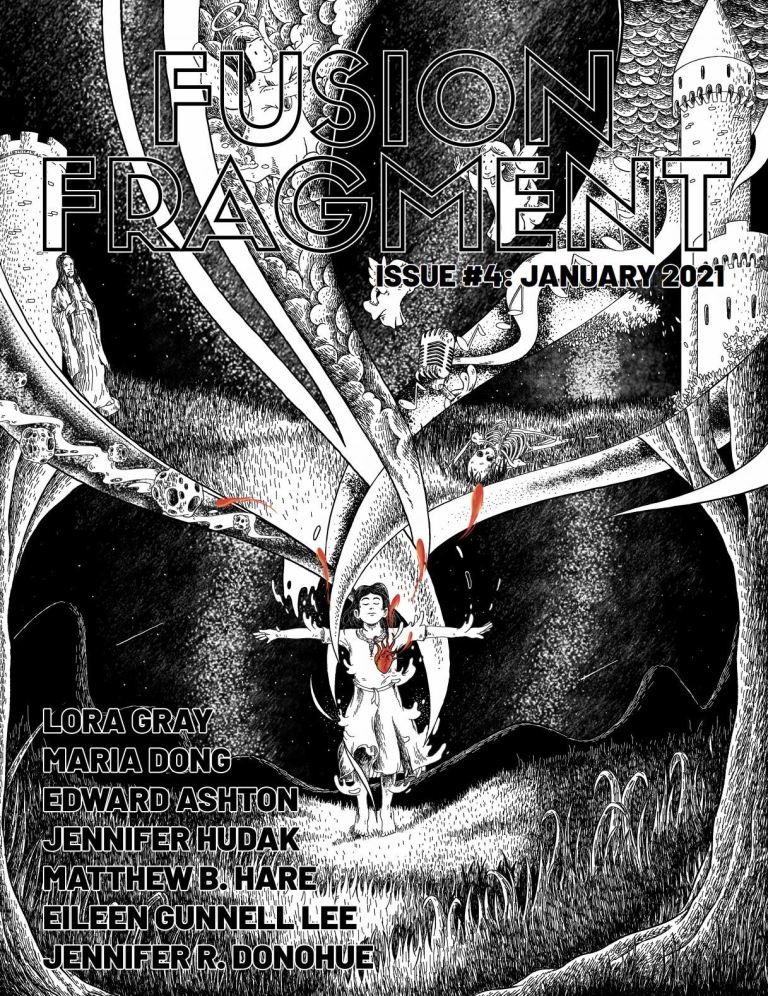
My first story published in 2021 is “In a Village Without Dogs,” a story I wrote shortly after I wrote “Baro Porrajmos, or Love in the Vardo” when I was researching family history, the history of discrimination against Romany people living in the UK, and experiences of Romany diaspora.
Cavan Terrill, the Publisher and EiC of Fusion Fragment, put some insightful interview questions to me, to be printed after the story in the issue. Because I am forever long-winded about writing, I went on too long and some of my answers were not ultimately printed in the issue. As such, I’m going to publish them here by way of talking about this story, which features a generation ship on which members of the Romany diaspora come together to try to decide whether they should answer a distress call from Earth.
Fusion Fragment Interview with Eileen Gunnell Lee
1. The question Erosabel asks—how do you go forward?—when she’s referencing the saying you used for the title, that seems to be the central question of the story. If you could dream for your characters for a moment, how do you imagine they move forward?
I did leave my characters in quite a fraught situation: Erosabel has lived through a harrowing ancestral-dream-experience in stasis and has woken after having her children taken from her to find that her partner Vashti has gone a bit mad from guilt and solitude. On top of that, Earth’s ecosystems have totally collapsed. I think the realization that Erosabel makes in the final line of the story is the beginning of regrowth for them. For generations the vitsas have been (rightly, to a degree) focused on Earth-side cultures as the enemy, and there has been strength for them in positioning themselves as completely separate from those cultures. But to avoid thinking about how each vitsa has taken their traumas onboard the exile ship, and how that has shaped them beyond anger results in some short-sightedness. When Erosabel realizes that Earth and its people are gone and that the fear remains, I have to believe that is the beginning of rehabilitation for her, for Vashti, and the others. They are truly on their own now. And confronting the fear and trauma that remains without further outside influence from Earth will revolutionize their social structures and their focus as a space-faring society. That act of confrontation will result in a catharsis that will become a turning toward, a movement of individual and collective solidarity. Erosabel’s deep love of Vashti, of her fellow Romanichal, of the ecosystem she has painstakingly maintained aboard the Chakra, will be an opening for her and will be nourishment for a great Romani flourishing.
2. You’ve mentioned to me that you come, distantly, from a Romani background. What was important to you about telling a Romani story?
My background is complicated, as many people’s backgrounds are. But my family is linked to South Asian diaspora, even on the side of my family that identifies as white. I started investigating the Romani link after the death of a beloved aunt, my last connection to my father who passed almost two decades ago. This story, as well as another of mine that was published by Escape Pod in 2017, is the result of researching Romani culture in the UK. My great-grandmother was a Romani woman who married a gadjo (that is, a non-Romani man) and left her vitsa in London. I never met her, nor my grandmother. But my grandmother was such a character; we have a lot of family stories about her tremendous strength, her quirky humour, and her deep and lasting love for my grandfather. I’ve flattened several generations into single characters in this story, but that was what I wanted to capture: the strength and ingenuity of Romani women and their descendents in the face of instability and oppression. Romani women are much maligned, experiencing the double oppression of race and gender, often even by their own people. But a strong feminist movement emerged among the Roma in Spain in the 1990s and has gained popularity, working toward gender equality while upholding the right to preserve cultural traditions, the right to be different, to refuse assimilation. As someone from a South Asian family that took up British traditions, assimilations of various kinds is something I’m preoccupied with and revisit often in my stories. Writing a story that is about resisting assimilation and confronting the pressures of assimilation and its individual and systemic effects was an intensely personal exploration.
3. What are you working on next?
Since the first pandemic lockdown I’ve been working from home and spending a lot of time exploring my neighbourhood, which is a semi-rural development between the city, conservation areas, and naturalized pipeline corridors. This focus has influenced my writing as I increasingly take inspiration from the ecological encroachments of invasive species, and the brutality of nature in these squeezed spaces. Along those lines, I’m picking away at an eco-horror novel which explores how climate change could influence my immediate escarpment ecosystem and how that might affect people’s relationships within those spaces. I’m also working on a short story collection. As for Stelliform Press, we have exciting climate fiction releases planned for 2021: a science fiction novella called The Impossible Resurrection of Grief by Octavia Cade, and our first novel, After the Dragons, from debut author Cynthia Zhang. I can promise you adorable and fierce dragons and resurrected thylacines and I’m very excited about that.
